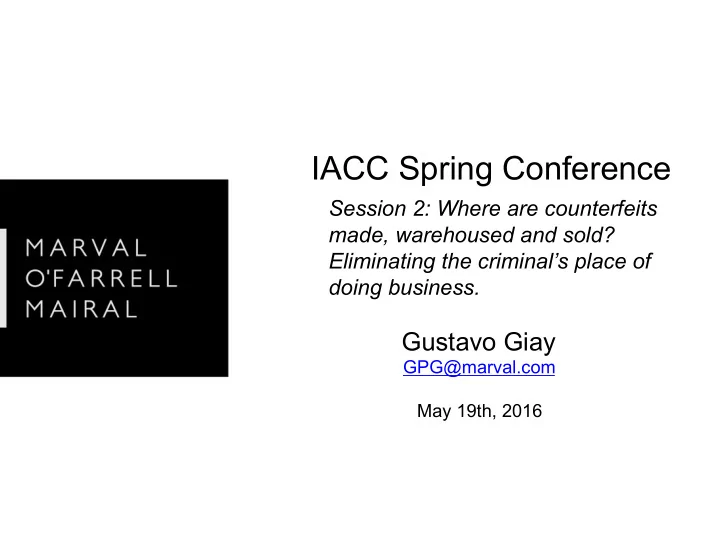

IACC Spring Conference Session 2: Where are counterfeits made, warehoused and sold? Eliminating the criminal’s place of doing business. Gustavo Giay GPG@marval.com May 19th, 2016
Why landlord liability is relevant in Latin America? Informal fairs or markets are a well-established reality and continue to be an increasing trend
Argentina: “La Salada” fair • Located in the Province of Buenos Aires • 3 warehouses, 30,000 vending stands, 250,000 shoppers per week • 560 illegal fairs replicating La Salada model (“little Saladitas”)
Bolivia: “Uyustus” fair • Located in the City of La Paz • More than 1,000 vending stands
Uruguay: “Techitos Verdes” fair • Located in the city of Montevideo • More than 100 vending stands
Other Notorious Markets included in the 2015 USTR List • Ciudad del Este (Paraguay) • Galería Pagé and 25 de Mar ç o (Brazil) • Tepito (México City) • San Juan de Dios (Guadalajara, México)
Why landlord liability is relevant in Latin America? Standard approaches to combating counterfeiting in illegal fairs or markets not working as expected
Why landlord liability is relevant in Latin America? • The issue is still at a nascent stage • Trademark laws generally silent on liability for indirect infringers • Lack of specific legislation discourages new cases
Pursuing landlords for counterfeiting in Latin America Wishful thinking or worthwhile remedy?
Two successful precedents • Shopping 25 de Março case (Brazil, 2012) ü Brand owners sued the shopping mall manager (Calinda) ü Sao Paulo State Court of Justice found Calinda liable “Calinda had a duty to prevent the sale of counterfeits” ü Brazilian Superior Court of Justice confirmed (split decision) “When such illegal practice is widely known and reported by the press it becomes an undisputed fact which gives rise to liability”
Two successful precedents • Galeria La Morocha case (Argentina, 2013) ü Street vendors used Galeria stores for overnight storage for a fee and Galeria manager collected a percentage ü Galeria manager rented the building from a third party ü Building owner personally collected the rent at the Galeria stores ü Building owner was convicted on the grounds that ” continuing with the lease constituted essential cooperation ”
Conclusions • Actions against landlords are most appropiate when: • Individual infringers are insolvent • Scale in a market is severe • Counterfeits are sold openly • Brand owner suffers significant harm • Landlord remains passive or inactive
Conclusions • Knowledge requirement is vital to ensure a successful action • Constructive knowledge should not be difficult to prove • Applying nuisance laws (other than Trademark Law) may also lead to a positive outcome
THANK YOU VERY MUCH
Recommend
More recommend